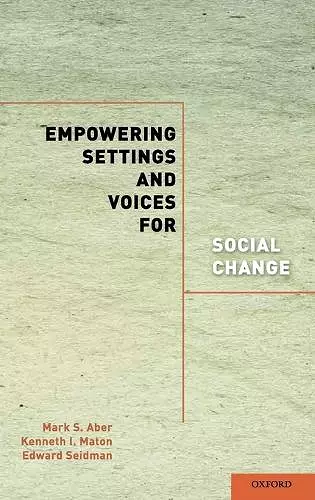Empowering Settings and Voices for Social Change
James G Kelly author Edward Seidman editor Kenneth I Maton editor Mark S Aber editor
Format:Hardback
Publisher:Oxford University Press Inc
Published:23rd Dec '10
Currently unavailable, and unfortunately no date known when it will be back

Empowering Settings and Voices for Social Change combines a focus on understanding social settings as loci for empowering intervention with a focus on understanding and giving voice to citizens. The volume illuminates advances in theory and method relevant to changing a broad spectrum of social settings (including programs, organizations, institutions, communities and social policy) from a strengths-based perspective. Three cross-cutting concepts -- a strengths-based approach to research and social action, empowerment, and narrative research methods -- serve as integrating and foundational themes. Part I takes up issues of setting processes and outcomes of influence, research methods, and implications for setting and community change efforts and social policy. Questions addressed in Part I include: What is the nature of current and future conceptualizations of social settings? What are the actionable features in social settings? How can settings that place a premium on empowerment and promotion be created or restructured? What are the organizational characteristics of empowering community settings? What mechanisms mediate the impact of these characteristics on individual well-being? Part II examines how action scientists have sought to understand and amplify the voices of those individuals and communities who serve as the focus of their research and social change actions. Part II authors explore the role of institutional beliefs, community narratives, and personal stories in recovery from serious mental illness; trace the cultural contours of "mental health" among the Gros Ventres of the Fort Belknap Indian reservation; examine youth voice in the juvenile justice system, illuminating the loss of focus on individualized justice and accountability to youth; and, outline ways in which community narrative can enrich culturally anchored work in prevention and public policy. Finally, chapters in Part III seek to situate the rest of the volume's chapters in the context of decades of work on empowering settings, giving voice and social change.
"This landmark book brings empowerment alive in the narratives of settings and marginalized populations that push for social change. The renowned community psychologist Julian Rappaport championed empowerment, citizen-grown solutions, and a brilliant skepticism about theory, method, and context. In this volume lovingly prepared by former students, colleagues, and admirers, we are forced to think deeply about constraints against and possibilities for change in diverse domains such as youth settings, juvenile justice, prevention, mental health in an American Indian community, and recovery from mental illness. Critical commentary at every turn enriches the debate. A fitting tribute, an original and creative contribution, and a must read for all concerned with the future of societal services and human development." Rhona S. Weinstein, Professor of the Graduate School, University of California, Berkeley "The chapters in this volume contain the latest word in the concepts of empowerment used as the stimulus for research and community interventions, and narrative used diagnostically, as intervention and for evaluation. It also contains analytic work on these concepts and critiques of their ambiguities and limitations. The authors, former students, colleagues and friends of Julian Rappaport, have put together a volume that shows the range of efforts in community psychology that have been influenced by him. The volume is a fitting tribute to Julian who also contributes an interesting personal intellectual history." Murray Levine, Distinguished Service Professor Emeritus, SUNY at Buffalo "This volume honors the enormous contributions of Julian Rappaport's strength-based social action approach, featuring empowerment, narratives, and the mutual influence process. The contributors of this edited volume provide creative, insightful examples of how Rappaport's energizing concepts have transformed the field of Community Psychology over the past three decades." -- Leonard A. Jason, Director, Center Center for Community Research, DePaul University "Julian Rappaport's writings have been a major force in shaping the field of community psychology. This book provides a vivid description by major figures in community psychology of how Rappaport's ideas about empowerment, the use of narrative, and giving voice to marginalized individuals and groups have impacted social change in diverse settings. Those working in community settings as well as graduate students will find this book invaluable." -- Ronald Roesch, Professor of Psychology, Simon Fraser University "This is an enjoyable, compelling, conceptually coherent, and challenging book. While it is written by community psychologists about a community psychologist, psychologists of all fields concerned with social justice, methods, diversity, and well-being will find stimulating chapters with applicability far beyond community psychology." -- Isaac Prilleltensky, PsycCRITIQUES
ISBN: 9780195380576
Dimensions: 160mm x 241mm x 19mm
Weight: 522g
262 pages